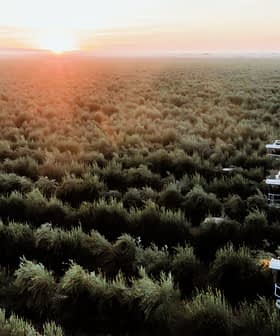Tens of Thousands Protest Olive Oil Prices in Madrid
Protestors called on the Spanish government and European Union to change how the industry is regulated, help producers cope with low prices and protect Spanish olive oil from U.S. tariffs.
“PRECIOS JUSTOS PARA UN OLIVAR VIVO,” read one banner, which stretched across the entirety of a wide Madrid boulevard and took 16 men to carry.
“Fair prices for a living olive grove.”
Tens of thousands of olive growers and oil producers (estimates range from 15,000 to more than 30,000) marched in the streets of the Spanish capital on Thursday, demanding something be done about the unsustainably low prices they have been receiving for their olive oils since March.
What we hope is that, after the success of the demonstration, the tasks for which we have come will be achieved.
The protestors demanded that both the Spanish government and the European Union take concrete actions to help improve their economic situation. They also voiced their displeasure at being caught up in a simmering trade dispute between the E.U. and the United States.
As of October 18, some Spanish olive oil exports to the U.S. will face a 25 percent tariff. Roughly 50,000 tons of olive oil exports are expected to be impacted.
See Also:Spain Reacts to U.S. Tariffs on Olive OilOrganizers of the protest, which include the Association of Young Farmers (ASAJA), the Coordinator of Agriculture and Livestock Organizations (COAG) and the Union of Small Farmers (UPA), have demanded that the government increase its investments in traditional olive groves, change the rules regarding self-regulation within the framework of the future E.U. Common Agricultural Policy (CAP) and negotiate with the U.S. to get olive oil off of its list of retaliatory tariffs.
Luis Carlos Valero, the director of ASAJA Jaén, said that it was especially important for producers to be able to privately store oil from one year to the next without having to worry about being accused of speculation in the European Court of Competition.
“The first is that the extension of the standard is recognized through the Interprofessional of Olive Oil [an organization that represents producers, distributors and exporters] by the European Union and we can save the oil from one year to the next without being taken to the Court of Competition under the assumption that we are speculating,” he said.
This step, Valero argued, would help keep prices consistent from on-year to off-year and provide producers with the financial stability they need to maintain their groves and provide for their families.
In a series of statements on Twitter, the Ministry of Agriculture, Fisheries and Food (MAPA) said that it had heard the protesters’ demands and would continue the work it was already doing to meet the ones it could.
“[Minister of Agriculture] Luis Planas conveys to the olive oil sector once again that he shares the concern about the anomalous evolution of prices in this campaign and emphasizes that for this reason, he has been working with the agri-food cooperatives of Spain,” MAPA said in response to the protesters.
“Regarding the claims of the olive oil sector, Luis Planas notes the work that has already been done together with the sector in recent months with understanding, solidarity and support,” the ministry added.
At the end of it all, Valero said that he was happy with how the protests went. He believes the government knows exactly what olive farmers and producers want from them.
“The protest has been a great success for the large influx of farmers and olive growers from all over Spain,” he said. “What we hope is that, after the success of the demonstration, the tasks for which we have come will be achieved.”








